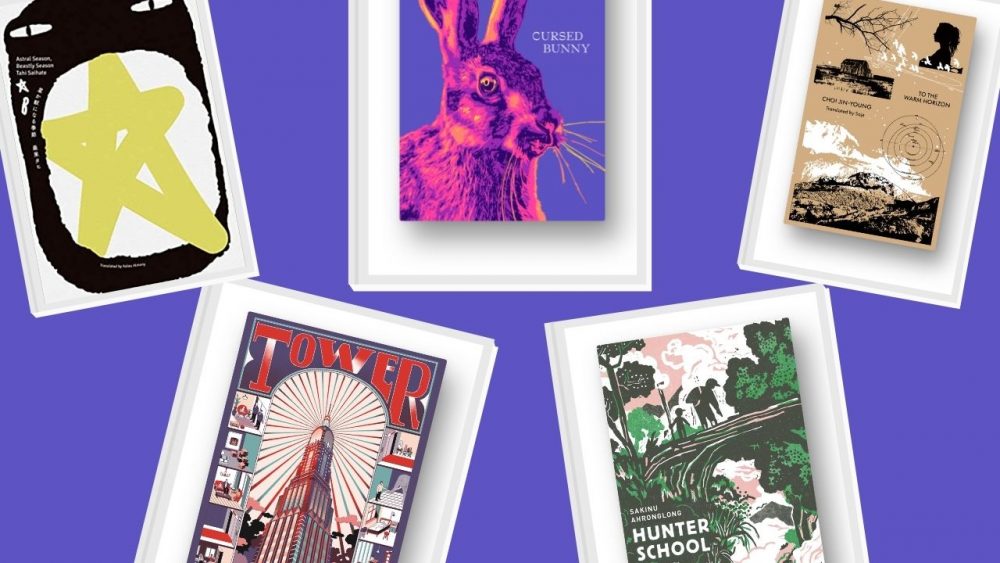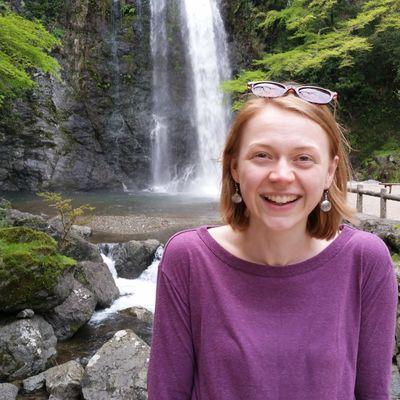Here’s our next installment of ‘Meet the Translator‘, where we aim to talk to translators from around the world. We’re catching up with Louise Heal Kawai, a Japanese to English literary translator. Louise comes from Manchester, UK and is based in Yokohama, Japan. Her most recently translated work is the gripping Seventeen by Hideo Yokoyama.
Her other translations include Ms Ice Sandwich by Mieko Kawakami, A Quiet Place by Seicho Matsumoto, and Yakuza Moon: Confessions of a Gangster’s Daughter by Shoko Tendo.

How many languages do you speak and what made you learn them?
I studied French from age 11 at school in the UK and loved it, so went ahead and chose German as an optional subject. Then I majored in French at University, keeping up the German too for a while. The literature of both languages as well as translation were my favourite parts of my course.
After graduation, I moved to Japan to teach English, and my love of Japanese began. I still speak passable French but my German comes out as Japanese these days.
How did you get started as a translator?
I became a literary translator after completing the MA in Advanced Japanese Studies from Sheffield University in the UK. (This used to be offered to people living in Japan as a distance learning qualification, but sadly not anymore.)
My dissertation was an annotated translation of an excerpt from the novel Onnatachi no Jihaado by Shinoda Setsuko. It was a book by a woman about the struggle of OLs to find meaning in their lives and jobs, and it was the first full-length novel I’d read in Japanese. It took me forever but I loved it.
Shortly after getting my MA I tried out to be a translator for the Japanese Literature Publishing Project and Kodansha International, and my first few jobs were for those organizations.
Following on from the theme of my dissertation, all of the authors I translated were women. Sadly, Kodansha International closed down and JLPP no longer sponsors translations. There was a several year gap in my resume as I tried to build new connections with publishers.
What are the best and worst parts of your job?
The best is the creative part. The joy at finding just the right word or phrase to express the Japanese. Or to feel that you found the author or characters’ voices. Second best would be the pleasure of holding in your hand a book that you translated.
And for a response that covers both best and worse, there is the delight of seeing a good review of a book you’ve translated that mentions the translator’s name and even praises their work!
So many reviewers don’t mention the translator, and one wonders how the reader imagines the book got from Japanese to English. I frequently read words like “flowing prose” “beautifully written” but all attributed to the original author.
Technically, those are the translator’s words, based on what the author wrote, and it would be nice to have that acknowledged.
But the absolute worst is, without doubt, the business side. As with any other profession, connections matter. Getting to know people, and being known is vital. In the early days of my career I lived in Fort Worth, Texas where there was absolutely no Japanese literary community.
Later I moved back to Nagoya, where still it was hard to meet anyone. These days I live near Tokyo and for the first time in my career I am meeting authors, fellow translators and publishers. To some extent your work speaks for itself, but having connections in the business is more often the way to get a translation job.
What do you wish people knew about translation? And what advice would you give someone who wants to become a translator?
That google translate is not a magic button! I wish that people knew that translation takes time and care and a human being!
I am a member of a small group of literary translators who help each other and we call ourselves HILT (Humans in Literary Translation) as a pushback against the pervasiveness of machine translation everywhere. To be a good literary translator, you need to be a good writer and an extensive reader in your own language.
Every time you translate a novel or a short story you are rewriting it in English, and it has to be readable in its own right. It shouldn’t be a direct word-for-word translation from the Japanese, which is bound to read awkwardly. So my advice is read lots (in Japanese and English) write, go on courses to improve your skill (where you will also meet people and make connections.)
Are you particularly selective about what you translate? How do you choose which books to undertake?
This question would probably elicit a wry smile from most literary translators I know. The truth is, that with only 2-3% of all books published in English being a translation, and then a tiny fraction of that number being books translated from Japanese, there is not much chance for a translator to be selective about what he or she works on.
The power is with the English language publisher and what they decide to purchase the rights to.
A translator can suggest a book, write a synopsis of it, submit a sample translation, but ultimately unless the publisher believes it will sell, they will not publish it. (And worse, they may pick a book that you pitch, but ask someone completely different to translate it.)
Most of my work has come from offers from publishers to translate specific books. Building up a relationship of trust with publishers so that they will ask me to translate a book for them has been key.
How long does it take to translate a book, on average?
I’ve got faster with experience, but this really does depend on the book. Ms Ice Sandwich by Mieko Kawakami which was only 20,000 words in English took me two months.
Hideo Yokoyama’s novel Seventeen about the crash of JAL Flight 123, which needed a lot of research on top of translation and came in at 110,000 words, took closer to six months. These numbers are for the first drafts that you submit to the publisher. There is always further editing later.
How involved are you, in the promotion of the books you translate? Your views on social media?
Of course I try in my own way to promote the books I translate (and good translations done by my colleagues) through social media (Facebook, Twitter) but there are only so many people I can reach. I wish that publishers would use translators more in their promotion of books – after all, apart from the original author, who knows the book better than its translator?
However, the reality is usually once the final draft is submitted, the translator doesn’t hear again from the publisher.
It’s a business and by delivering the manuscript we have held up our end of the bargain. Most translators’ names do not even appear on the cover of the books they translate. (I’m still waiting to see mine!) There are exceptions, but they are rare.
Earlier this year though I was asked by a publisher to take part in a radio interview by the BBC, and I know of another translator who went on an international book tour with her author, so possibly things are changing. More recently I was asked by Farrar Straus and Giroux to write an essay on the issues of translating one particular book – Seventeen by Hideo Yokoyama. It was published on their website in time for the novel’s US release.
Thank you Louise! If you’d like to know more you can follow her on Twitter.



